|
|
|
Sort Order |
|
|
|
Items / Page
|
|
|
|
|
|
|
| Srl | Item |
| 1 |
ID:
185326
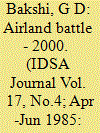

|
|
|
| 2 |
ID:
142913
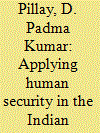

|
|
|
|
|
| Summary/Abstract |
This article explores the concept of human security and examines the scope for its adoption as a normative and policy framework in India. Human security prioritises non-military methods as a means of achieving security without compromising the priorities accorded to traditional security threats. It requires the fulfilment of people’s basic needs and rights. The objective of the article is to show that the human security approach can be usefully applied as a policy measure in India to reinforce successes in the social and economic spheres so that the possibility of dissatisfaction turning into violent opposition and internal conflict is minimised.
|
|
|
|
|
|
|
|
|
|
|
|
|
|
|
|
| 3 |
ID:
140311
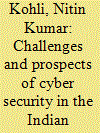

|
|
|
| 4 |
ID:
185379
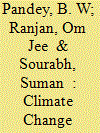

|
|
|
|
|
| Summary/Abstract |
The Ratchet Mechanism that got configured from the Paris Agreement of 2015 paved the way for the Conference of Parties (COP 26) at Glasgow (UK) (Issa and Krzanowski, 2021). Thitherto to COP 25 was held at Madrid, Spain under the Chilean presidentship but no robust result could be achieved.
|
|
|
|
|
|
|
|
|
|
|
|
|
|
|
|
| 5 |
ID:
133051
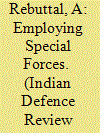

|
|
|
|
|
| Publication |
2014.
|
| Summary/Abstract |
In the Indian context, the Parachute Brigade, being the only formation of its kind available nationally, has performed the dual role of being a strategic reserve tasked for conventional operations, and also that of acting as a rapid reaction force capable of intervention/forced entry in OOAC as was carried out during Op Cactus in the Maldives in 1988. This latter role has subsequently gained in importance due to the nuclearisation of the subcontinent and the substantial reduction in operational battle space that resulted, and also because ot our increasing economic and geo-political clout in the region. Thus, we have created a unique beast, neither Ranger nor Airborne; a potent mix that fulfills both its roles in our area of influence and that has, over the years, met our requirements admirably.
|
|
|
|
|
|
|
|
|
|
|
|
|
|
|
|
| 6 |
ID:
169481
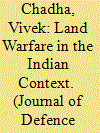

|
|
|
|
|
| Summary/Abstract |
The Indian Army is in the process of a transformative effort, envisaging changes not only at the apex level, within the Army Headquarters, but also in the field, with the concept of Integrated Battle Groups likely to be implemented soon. The past record of major changes within the army suggests an incremental approach, and also disconnect between doctrinal thought and restructuring. The only exception were the changes post the 1975 military reforms. With the Land Warfare Doctrine suggesting the future direction of the army’s war fighting priorities, can the ongoing effort at transformation succeed? This will be influenced by the ability to adapt to the changing character of war and by re-prioritising change in light of budgetary realities that are likely to remain consistent into the future. Most importantly, even as structures are created, it is the organisational culture that must drive the transformation for real change to happen.
|
|
|
|
|
|
|
|
|
|
|
|
|
|
|
|
| 7 |
ID:
133592
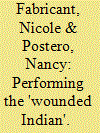

|
|
|
|
|
| Publication |
2014.
|
| Summary/Abstract |
This article examines Right-wing political performances in the Bolivian Eastern lowlands where regional elites claim to be living under the authoritarian dictatorship of Left-leaning President Evo Morales. We analyse how regional elites advocate for political autonomy through embodied and spectacular performances linked to discourses of indigeneity, human rights and democracy. Right-wing leaders try to legitimise their claims for justice and territorial control by strategically aligning themselves with lowland 'Indians' - who are equally wounded by Morales's plan to run a massive highway though their communities and territories. Through theatrical exhibits in the plaza and a spectacular assembly spotlighting an indigenous representative as an emblematic hero of TIPNIS, regional elites perform a shared history of marginalisation, while simultaneously presenting themselves as 'saviors'. We argue, however, that there is a dark side to these performances, as they elide long histories of racialised labour and economic injustice in the region.
|
|
|
|
|
|
|
|
|
|
|
|
|
|
|
|
| 8 |
ID:
186752
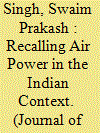

|
|
|
|
|
| Summary/Abstract |
With the announcement of the proposed theaterisation of the existing structure of the armed forces, there have been numerous exchanges of ideas, formal and informal discourses, official and unofficial exchange of views and perspectives in recent months. During such exchanges, a standpoint of equating the Air Force of a nation with the Artillery has emerged and it requires to be put in a proper perspective. Indian military history has unfortunately not highlighted the lethality and importance of air power, which is the root cause for incorrect understanding of air power. Therefore, the problem remains that despite being the most potent and lethal way of modern warfighting in the contemporary technological era, air power has been least understood. Such contradictory remarks clearly indicate the requirement of putting a proper perspective on matters like air power, theaterisation, integrated command Headquarters (HQs) and, most importantly, jointmanship. In an attempt towards that, the article will bring out the efficacy of air power citing examples from the wars and conflict on Indian soil. The article will also bring out the missing link of a proper perspective on the role of the Air Force, and analyse the importance of Air Force and air power as tools of modern warfighting and as the preferred choice of instrument for the national leadership. The lethality of air power cannot be discarded in the present technological era as it has been quite significant and decisive in numerous wars and conflicts. Air power is strategic in nature, capable of effect-based operations and parallel operations. Air forces around the world are transitioning from air to aerospace power in order to prepare for the future.
|
|
|
|
|
|
|
|
|
|
|
|
|
|
|
|
|
|
|
|
|